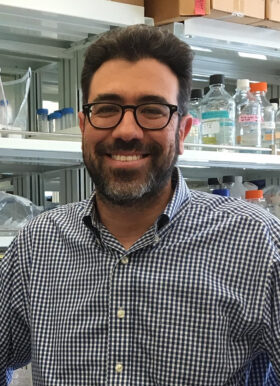
Brian Edelson, MD, PhD
Associate Professor, Pathology & Immunology
- Phone: 314-362-4427
- Email: bedelson@nospam.wustl.edu
Division
- Laboratory & Genomic Medicine
Additional Titles
- Co-Leader, Gateway Curriculum, Phase 1 Module 2 “Defense and Response to Injury”
- Washington University School of Medicine Academy of Educators
Related Links
Education
- BS: Brown University, Providence RI (1995)
- PhD, MD: Washington University School of Medicine, St. Louis, MO (2004)
- Residency, Clinical Pathology: Barnes-Jewish Hospital, St. Louis, MO (2009)
- Postdoctoral Work: Washington University School of Medicine, St. Louis, MO (2010)
Board Certifications
- Diplomate, Missouri State Board of Registration for the Healing Arts
- American Board of Pathology, Clinical Pathology
Clinical Interests
- Immunology, HLA, transfusion medicine
Research Interests
My laboratory is focused on two areas of immunology. First, we are interested in understanding how autoreactive T cells mediate autoimmune disease, particularly in multiple sclerosis (MS) and its mouse model, experimental autoimmune encephalomyelitis (EAE). We focus on how cytokine expression is regulated in autoreactive T cells in a cell-intrinsic manner through the action of transcription factors, and how these cytokines mediate disease pathogenesis. We are particularly interested in how T cell expression of granulocyte-macrophage colony stimulating factor (GM-CSF) and interleukin-10 (IL-10) is regulated, and how these cytokines act on cells of the innate immune system during autoimmune disease. My laboratory’s work in this area led to our discoveries that the transcription factor Bhlhe40 and the ZFP36 family of RNA binding proteins regulate cytokine production by T cells. Second, we are interested in understanding the development, heterogeneity, and function of monocytes, macrophages, and dendritic cells during immune responses. We use a variety of gene-deficient mice to analyze how specific monocyte, macrophage, and dendritic cell subsets carry out their non-redundant roles during autoimmunity and infection. We employ mouse models of Listeria monocytogenes and Heligmosomoides polygyrus infections in many of these experiments.
DBBS Graduate Program Affiliation
- Immunology
- Molecular Microbiology and Microbial Pathogenesis
Selected Publications
| Cook ME, Bradstreet TR, Webber AM, Kim J, Santeford A, Harris KM, Murphy MK, Tran J, Abdalla NM, Schwarzkopf EA, Greco SC, Halabi CM, Apte RS, Blackshear PJ, Edelson BT. The ZFP36 family of RNA binding proteins regulates homeostatic and autoreactive T cell responses. Sci Immunol. 2022 Oct 28;7(76):eabo0981. doi: 10.1126/sciimmunol.abo0981. Epub 2022 Oct 21. PMID: 36269839; PMCID: PMC9832469. |
| Webber AM, Bradstreet TR, Wang X, Guo H, Nelson CA, Fremont DH, Edelson BT, Liu C. Antigen-guided depletion of anti-HLA antibody-producing cells by HLA-Fc fusion proteins. Blood. 2022 Oct 20;140(16):1803-1815. doi: 10.1182/blood.2022016376. PMID: 36070233; PMCID: PMC9837442. |
| Cook ME, Jarjour NN, Lin CC, Edelson BT. Transcription Factor Bhlhe40 in Immunity and Autoimmunity. Trends Immunol. 2020;41(11):1023. doi: 10.1016/j.it.2020.09.002 PMCID: PMC7606821 PMID: 33039338 |
| Esaulova E, Cantoni C, Shchukina I, Zaitsev K, Bucelli RC, Wu GF, Artyomov MN, Cross AH, Edelson BT. Single-cell RNA-seq analysis of human CSF microglia and myeloid cells in neuroinflammation. Neurol Neuroimmunol Neuroinflamm. 2020;7(4). PMID:32371549 |
| Jarjour NN, Bradstreet TR, Schwarzkopf EA, Cook ME, Lai CW, Huang SC, Taneja R, Stappenbeck TS, Van Dyken SJ, Urban JF Jr, Edelson BT. BHLHE40 Promotes TH2 Cell-Mediated Antihelminth Immunity and Reveals Cooperative CSF2RB Family Cytokines. J Immunol. 2020;204(4):923-932. PMCID:PMC7002269 PMID:31900338 |
| Jarjour NN, Schwarzkopf EA, Bradstreet TR, Shchukina I, Lin CC, Huang SC, Lai CW, Cook ME, Taneja R, Stappenbeck TS, Randolph GJ, Artyomov MN, Urban JF Jr, Edelson BT. Bhlhe40 mediates tissue-specific control of macrophage proliferation in homeostasis and type 2 immunity. Nat Immunol. 2019;20(6):687-700. PMCID:PMC6531324 PMID:31061528 |
| Huynh JP, Lin CC, Kimmey JM, Jarjour NN, Schwarzkopf EA, Bradstreet TR, Shchukina I, Shpynov O, Weaver CT, Taneja R, Artyomov MN, Edelson BT, Stallings CL. Bhlhe40 is an essential repressor of IL-10 during Mycobacterium tuberculosis infection. J Exp Med. 2018;215(7):1823-1838. PMCID:PMC6028511 PMID:29773644 |
| Lin CC, Bradstreet TR, Schwarzkopf EA, Jarjour NN, Chou C, Archambault AS, Sim J, Zinselmeyer BH, Carrero JA, Wu GF, Taneja R, Artyomov MN, Russell JH, Edelson BT. IL-1-induced Bhlhe40 identifies pathogenic T helper cells in a model of autoimmune neuroinflammation. J Exp Med. 2016;213(2):251-71. PMCID:PMC4749922 PMID:26834156 |
| Lin CC, Bradstreet TR, Schwarzkopf EA, Sim J, Carrero JA, Chou C, Cook LE, Egawa T, Taneja R, Murphy TL, Russell JH, Edelson BT. Bhlhe40 controls cytokine production by T cells and is essential for pathogenicity in autoimmune neuroinflammation. Nat Commun. 2014;5:3551. PMCID:PMC4016562 PMID:24699451 |
Assistant:
Kelly Antolik
314-273-3048
kellyantolik@wustl.edu
Clinical Sciences Research Building, 7th Floor, Room 7739